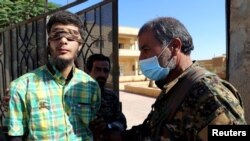The United States is trying to improve Syrian rebels' ability to detain what has become a steadily growing number of foreign fighters in Syria, the top U.S. commander in the Middle East told Congress on Tuesday.
Army General Joseph Votel, the head of U.S. Central Command, told members of the Senate Armed Services Committee that the U.S.-backed Syrian Democratic Forces were holding more than 400 detainees.
U.S. Defense Secretary Jim Mattis has been urging reluctant allies to address the escalating crisis by taking responsibility for their citizens who have been captured. During a meeting of allied defense ministers in Rome last month, Mattis pressed them to use diplomatic, legal and other means to take back citizens detained in Syria to make sure they don't get back on the battlefield. And the subject came up again during a meeting of NATO defense ministers that followed.
"We are working with our partners in the government here to work to get them back to their countries so they can be prosecuted in accordance with their laws,'' Votel told senators Tuesday.
Asked by Senator Lindsey Graham, a South Carolina Republican, if there was a "credible,'' long-term plan to detain the fighters inside Syria, Votel said the U.S. was working on that now.
So far, however, those entreaties to allies have been largely unsuccessful. Officials have said that only one or two detainees have been returned to their home countries.
British stance
As an example, British officials made it clear they did not want to accept the return of two notorious British members of an Islamic State cell who were commonly dubbed "The Beatles'' and were known for beheading hostages. The two men — El Shafee Elsheikh and Alexanda Amon Kotey — were captured in early January in eastern Syria and are being held by the SDF.
Belgium officials have also spoken against the return of any detainees to their country. Belgium Foreign Minister Didier Reynders has suggested that detainees be tried where they were captured.
Most of the foreign fighters are from the region, including Iraq and Saudi Arabia. Hundreds of them have fought alongside IS in recent years as it seized large parts of Syria, raising concerns they'll commit terrorism at home if they return.
The U.S. is mainly advising and working with the SDF and with other nongovernment organizations and the United Nations to ensure detainees get appropriate care, including food, beds and shelter from the weather. But the U.S. military in Syria doesn't have the funding or ability to actually solve detention facility shortages.
As the number of detainees increases, U.S. officials worry that the SDF will lose either the ability or the will to continue to hold them. Doing nothing, Mattis warned the allies, is not an option.




